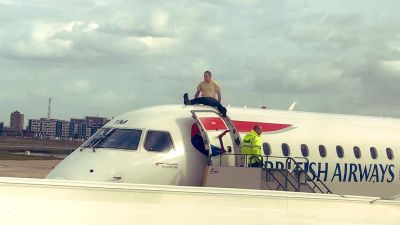Extinction Rebellion protester who glued himself to British Airways plane has sentence cut

A climate protester who superglued himself to the roof of a British Airways plane at London City Airport has had his 12-month jail sentence cut to four months by appeal judges.
Former Paralympic athlete and Extinction Rebellion activist James Brown, of Exeter, Devon, was convicted of causing a public nuisance with the stunt to draw attention to the climate crisis.
Brown, who has been registered blind since birth, was jailed by a judge at Southwark Crown Court in September after being convicted of causing a public nuisance at an earlier trial.
Lawyers representing Brown, who is in his late 50s, challenged his conviction and sentence at a Court of Appeal hearing in London in December.
Three appeal judges, Lord Burnett, the Lord Chief Justice, Lord Justice Singh and Mr Justice Goss, ruled on Friday that the 12-month jail term should be cut to four months but dismissed his appeal against conviction.
The three judges had said at the appeal hearing that Brown could be released on bail, pending the delivery of their ruling, but imposed a bail condition barring him from entering any airport where commercial flights operate.
Lawyers representing Brown said there had been no reason to charge him with causing a public nuisance, questioned the proportionality of the decision to bring the charge, and said he could have been charged with aggravated trespass.
Lawyers argued that the 12-month term was "manifestly disproportionate" and said Brown suffered "unique hardship" in prison because of his disability.
Judge Gregory Perrins, who had jailed Brown, said when passing sentence after the trial that he had "cynically used" his disability and put his "own life at risk" to carry out the stunt at London City Airport on October 10 2019.
The double gold medallist climbed onto the plane, which was destined for Amsterdam, before gluing his right hand to the aircraft and wedging his mobile phone in the door to prevent it from closing.
He livestreamed the protest until he was removed after an hour.
Southwark Crown Court heard a total of 337 passengers had their flights cancelled, missing birthday celebrations, business meetings and family events, with the disruption costing the airline around £40,000.
Brown, who represented himself at his trial, denied one count of causing a public nuisance, claiming he had "to do something spectacular" to draw attention to the climate crisis. He was found guilty after a jury deliberated for less than an hour.
Lord Burnett said, in a written ruling, that people who caused major disruption at airports and were convicted of causing a public nuisance ran "a substantial risk" of going to prison.
But he said appeal judges had considered whether a 12-month jail term was "manifestly excessive" in the light of Brown’s conduct, antecedents and disability.
He added: "The right to peaceful protest should not lead to tolerance of behaviour that is far removed from conveying a strongly held conviction but instead seeks to cause chaos and as much harm as possible to members of the public."